Japan-Russia Relations
Foreign Minister Fumio Kishida Visits Russia
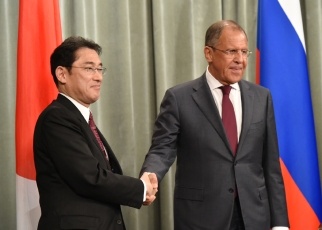
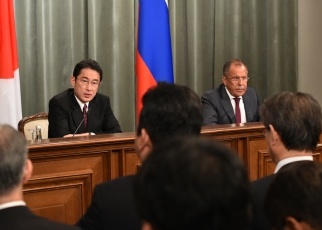
On September 21, commencing at 5:20 p.m. (local time; same hereinafter) for approximately two hours and twenty minutes, Mr. Fumio Kishida, Minister for Foreign Affairs of Japan, who visited Moscow from September 20 to 22, held a Japan-Russia Foreign Ministers’ Meeting with Mr. Sergey Lavrov, Minister of Foreign Affairs of the Russian Federation, and a joint press conference and a working dinner until after 11:00 p.m.
On September 22, commencing at 10:00 a.m. for approximately four and half hours (including working lunch), Minister Kishida held the 11th Meeting of the Japan-Russia Intergovernmental Committee on Trade and Economic Issues with Mr. Igor Shuvalov, First Deputy Prime Minister of Russia. The overview of each meeting is as follows.
- I. Japan-Russia Foreign Ministers’ Meeting (including working dinner)
- 2. Meeting of the Japan-Russia Intergovernmental Committee on Trade and Economic Issues
[Key Points]
- An in-depth discussion on the Northern Territories issue took place between the foreign ministers, and the negotiations for the conclusion of a peace treaty, which had effectively been temporarily suspended, were resumed. It was affirmed that vice-ministerial level consultations on concluding the peace treaty will be held on October 8.
- The two sides shared the view that direct dialogues between the two countries’ leaders and foreign ministers will continue in a variety of formats, including utilizing the opportunities offered by international conferences and other events.
- The both sides confirmedthe progress in fields such as the economy (urban environment, medical care, agriculture, etc.), working-level and inter authority cooperation (fisheries, science and technology, etc.), and people-to-people exchanges (youth and inter-university exchanges).
- Both sidesexchanged views on pressing international issues such as Ukraine, Syria ,North Korea and regional affairs. It was affirmed that discussions will take place between Japanese and Russian diplomatic authorities on the areas of the United Nations, disarmament and non-proliferation, and the Middle East.
I. Japan-Russia Foreign Ministers’ Meeting (including working dinner)
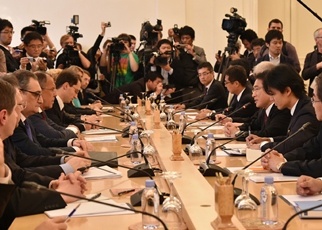
(1) Territorial issue
(ⅰ) Minister Kishida provided a clear explanation of Japan’s position on the Northern Territories issue. An in-depth discussion took place between the foreign ministers, and the negotiations for the conclusion of a peace treaty, which had effectively been temporarily suspended, were resumed.
(ⅱ) In this discussion, Minister Kishida reiterated that Russia’s recent repeated unilateral actions and comments in connection with the Northern Territories are highly regrettable and unacceptable, and lodged a protest.
(ⅲ) Minister Kishida clearly countered the Russian side’s conventional assertions on the historical and legal arguments, insisting that Japanese side has different recognition and that is why a peace treaty has not been concluded between Japan and Russia.
(ⅳ) Following an intense exchange between the foreign ministers they reaffirmed work on creating solutions that are acceptable to both sides, in line with the view shared between Mr. Shinzo Abe, Prime Minister of Japan, Mr.Vladimir Putin President of the Russian Federation in April 2013. Minister Kishida noted the need to undertake discussions on that basis, and the two sides shared the view that vice-ministerial negotiations for the conclusion of a peace treaty will take place between Mr. Shinsuke Sugiyama, Deputy Minister for Foreign Affairs of Japan, and Mr. Igor Morgulov, Deputy Minister of Foreign Affairs of Russia, in Moscow on October 8, as a follow-up to this discussion.
( 2) Political dialogue
Minister Kishida and Minister Lavrov shared the view that direct dialogues between the two countries’ leaders and foreign ministers will continue in a variety of formats, including utilizing the opportunities offered by international conferences that both sides attend.
( 3) Bilateral working-level fields
(ⅰ) Fisheries industry
Minister Kishida explained that it is regrettable that a bill prohibiting driftnet fishing of salmon and trout in Russian waters has been passed in Russia, and the two sides affirmed that they will work positively on Japan-Russia cooperation in the fisheries field, such as holding working-level discussions between the two countries, including discussions on alternative approaches to driftnet fishing.
(ⅱ) Four-islands Exchange Program and visits to graves in the Northern Territories, etc.
The two sides shared the view that working-level discussions will take place in order to smoothly implement the Four-islands Exchange Program and visits to graves in the Northern Territories, etc., which ran into some problems this year, and preparations for the next year’s Four-islands Exchange Program will promptly move ahead.
(ⅲ) Vitalizing people-to-people exchanges
The two sides affirmed that exchanges of views on vitalizing people-to-people exchanges will take place, and as one part of that, a consultation between the two countries’ consular authorities will take place in the near future.
(ⅳ) Internments in Siberia
Minister Kishida explained that 70 years have passed since the end of World War II, and in light of the growing interest in Japan on recovering the remains of the war dead, including those who died during the internments in Siberia, he expressed his appreciation for the efforts by the Russian side in relation to the provision of materialson internments in Siberia, and requested ongoing cooperation.
(ⅴ) Japan-Russia cooperation on combating narcotics for Afghanistan and Central Asia
The foreign ministers noted that Japan and Russia are undertaking beneficial cooperation on measures to counter Afghan narcotics, and shared the view that this cooperation will be continued and advanced from fall this year.
( 4) International affairs
The foreign ministers exchanged views on pressing international issues and regional affairs, and shared the view that discussions will take place between the two countries’ diplomatic authorities on areas such as the UN, disarmament and non-proliferation, and the Middle East.
(ⅰ) Ukraine
Minister Kishida strongly urged that Russia play a constructive role in fully implementing the Minsk Agreements, including maintaining the ceasefire and withdrawalweapons.
(ⅱ) Syria
The foreign ministers shared the view that they should take effort tostabilize the situation. Minister Kishida strongly encouraged Russia to correspond to the situation with transparency while taking into account the interests and concerns of the relevant countries, in order to avoid inviting further turmoil in the region.
(3) North Korea
In a discussion on the launch of a long-range ballistic missile, purported to be for a “satellite,” it was noted that if such action occurs it will be a clear violation of resolutions by the UN Security Council, and the foreign ministers shared the view that it is necessary to requireNorth Korea to exercise self-restraint with provocative actions and comply with the Security Council resolutions and the Joint Statement of Six-Party Talks. Minister Kishida requested Russia’s continued understanding and cooperation on the abductions issue, and Minister Lavrov indicated his encouragement and support.
2. Meeting of the Japan-Russia Intergovernmental Committee on Trade and Economic Issues
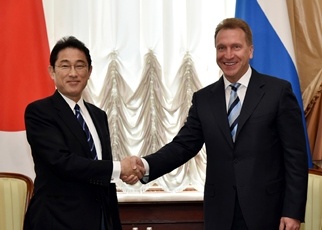
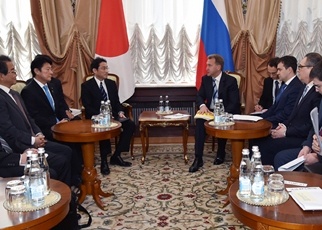
(1) In the small group meeting, Minister Kishida introduced that despite the recent global economic situation and the environment surrounding Russia, Japanese companies are still interested in doing business with Russia, and noted that he willcommunicate well with First Deputy Prime Minister Shuvalov and make preparations so that progress and outcomes that satisfy both sides on the political front and economic front can be obtained in the future.
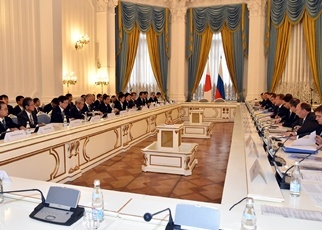
(2) At the plenarymeeting and working lunch held after the small group meeting, the both sides exchanged each topic, including cooperation in fields such as urban environment, medical care and agriculture, and reviewed the progress in Japan-Russia economic relations since the previous meeting held in approximately three years ago.
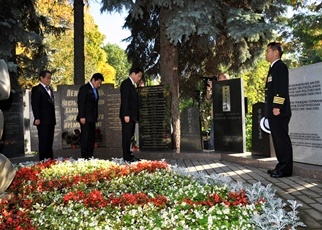
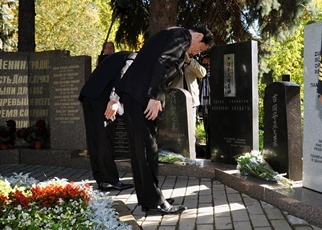
(3) At the same time, the Japanese side called for improvements on the business problems Japanese companies face and on the trade and investment environment. Additionally, representatives of Japan’s business community who attended the committee meeting also presented points of view that will be beneficial to advancing Japan-Russia economic relations in the future. The Russian side expressed the view that it will seriously take the points raised by the Japanese side seriously, and intends to promote cooperation in each field.

